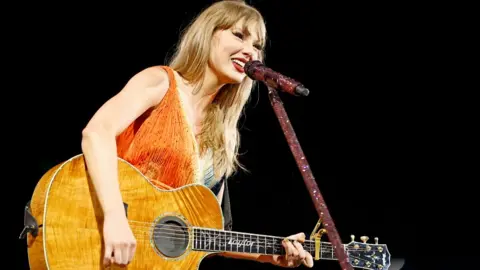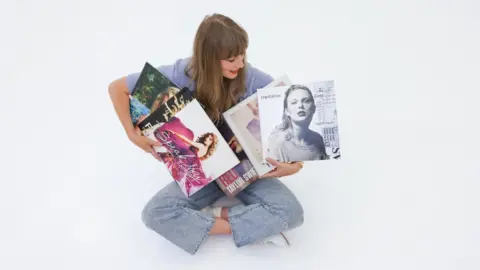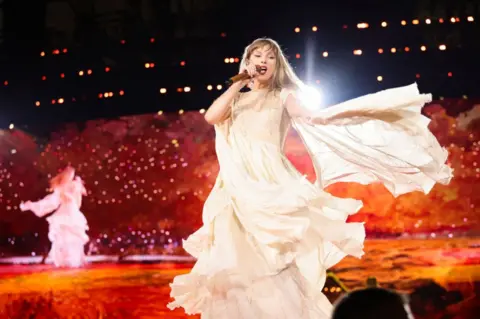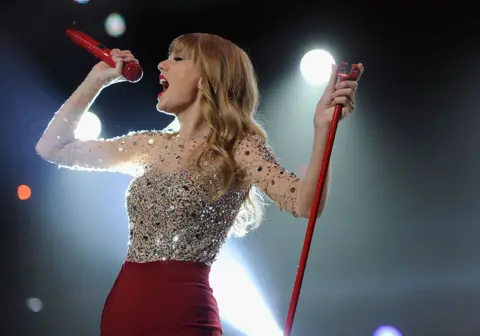Music Correspondent
 Getty Images
Getty ImagesTaylor Swift has bought back the rights to her first six albums, ending a long-running battle over the ownership of her music.
“All of the music I’ve ever made now belongs to me,” said the star, announcing the news on her official website. “I’ve been bursting into tears of joy… ever since I found out this is really happening.”
The saga began in June 2019, when music manager Scooter Braun bought Swift’s former record label Big Machine and, with it, all of the songs from Taylor Swift, Fearless, Speak Now, Red, 1989 and Reputation.
Swift had personal objections to the deal, blaming Braun for complicity in the “incessant, manipulative bullying” against her by Kanye West, one of his clients.
Reputation (Taylor’s Version) delayed?
 Taylor Swift
Taylor SwiftSwift responded by vowing to re-record those records, effectively diminishing the value of those master tapes, and putting ownership back in her hands.
To date, she has released four re-recorded albums – known as “Taylor’s Versions” – with dozens of bonus tracks and supplementary material.
In her letter, the star told fans she had yet to complete the project, after “hitting a stopping point” while trying to remake 2017’s Reputation album – which dealt with public scrutiny of her private life, and the fall-out of her feud with Kanye West.
“The Reputation album was so specific to that time in my life,” she explained. “All that defiance, that longing to be understood while feeling purposefully misunderstood…
“To be perfectly honest, it’s the one album in those first six that I thought couldn’t be improved by re-doing it… so I kept putting it off.”
The star recently previewed the new version of Reputation’s first single, Look What You Made Me Do, in an episode of The Handmaid’s Tale – but her letter suggested that a full re-recording would be delayed or even scrapped.
However, she promised that vault tracks from the record would be released at a future date, if fans were “into the idea”.
What is a master recording?
In the music industry, the owner of a master controls all rights to exploit the recording. That includes distributing music to streaming services, pressing new physical CDs and vinyl, creating box sets, or licensing songs to movies or video games.
The artist still earns royalties from those recordings but controlling the master offers a level of protection over how the work is used in the future.
Swift, as the writer or co-writer of her music, always maintained her publishing rights, which meant she was able to veto attempts to license songs like Shake It Off and Love Story to other companies.
“I do want my music to live on. I do want it to be in movies. I do want it to be in commercials. But I only want that if I own it,” she told Billboard in 2019.
It is not known how much Swift paid to acquire her masters, but the catalogue previously sold for $300 million (£222 million) in 2020.
Swift said the deal also included all of her concert films, music videos, artwork and unreleased recordings.
“To say this is my greatest dream come true is actually being pretty reserved about it,” she added, thanking fans for their support as the drama played out.
“I almost stopped thinking it could ever happen, after 20 years of having the carrot dangled and then yanked away,” she wrote.
“But that’s all in the past now.”
 Getty Images
Getty ImagesHow did the sale of Taylor Swift’s masters happen?
When 14-year-old Taylor Swift moved to Nashville in 2004 to chase her dream of becoming a country pop star, she signed a record deal with Big Machine.
Label boss Scott Borchetta gave the unproven singer a big cash advance in exchange for having ownership of the master recordings to her first six albums “in perpetuity”.
This was fairly common practice in the era before streaming, when artists needed record label backing to get played on the radio, and for the manufacture and distribution of CDs.
Swift’s deal with Big Machine expired in 2018, at which point she left and signed with Republic Records and Universal Music Group (UMG).
A year later, Borchetta sold his label to Scooter Braun’s Ithaca Holdings.
Swift said she only learned about the deal when it was announced; characterising it as an act of aggression that “stripped me of my life’s work”.
She labelled Braun – who rose to prominence as the manager of Justin Bieber and Ariana Grande – as “the definition of toxic male privilege in our industry”.
She also expressed frustration that she had been unable to make a counter offer for her music.
“I spent 10 years of my life trying rigorously to purchase my masters outright and was then denied that opportunity,” she told Billboard, adding that: “Artists should maybe have the first right of refusal to buy.”
Braun later told Variety that the dispute had “gotten out of hand” after he and his family received death threats.
The music mogul later sold his stake in Swift’s back catalogue to Shamrock Holdings, a Los Angeles investment fund founded by the Disney family in 1978, in November 2020.
The multi-million dollar deal left Swift feeling betrayed again.
“This is the second time my music had been sold without my knowledge,” she said in a social media post.
While she was “open to the possibility of a partnership with Shamrock”, she subsequently learnt that, under the terms of the sale, Braun would “continue to profit off my old music” for years.
“I simply cannot in good conscience bring myself to be involved in benefiting Scooter Braun’s interests,” she wrote in a letter to the company, which she posted on X.
 Getty Images
Getty ImagesShe began releasing her re-recorded albums in 2021, starting with her breakthrough, coming-of-age album Fearless.
Produced with forensic attention to detail, they were often indistinguishable from the originals – albeit with slightly cleaner mixes, and greater separation between the instruments.
But the big attraction was the bonus tracks, including the unabridged, 10-minute version of her break-up ballad All Too Well – described by Variety magazine as the “holy grail” of the star’s back catalogue.
The song went on to top the US charts, and made number three in the UK – where it is the longest song ever to reach the top five.
In the meantime, the singer continued to release original material, including the Grammy Award-winning albums Folklore and Midnights.
In 2023, Forbes magazine reported that Swift had become the first musician to make $1 billion (£740,000) solely from songwriting and performing.
Half of her fortune came from music royalties and touring, while the rest came from the increasing value of her music catalogue, including her re-recordings.
Revisiting the old material also inspired Swift’s career-spanning Eras tour, which made more than $2 billion (£1.48 billion) in ticket sales across 2023 and 2024.
In her letter, Swift said the success of the Eras tour “is why I was able to buy back my music”.
She added that she was heartened to see her struggle inspiring other artists.
“Every time a new artist tells me they negotiated to own their master recordings in their record contract because of this fight, I’m reminded of how important it was for all of this to happen.
“Thank you being curious about something that used to be thought of as too industry-centric for broad discussion.
“You’ll never know how much it means to me that you cared. Every single bit of it counted, and ended us up here.”
www.bbc.com
#Taylor #Swift #buys #rights #master #recordings






